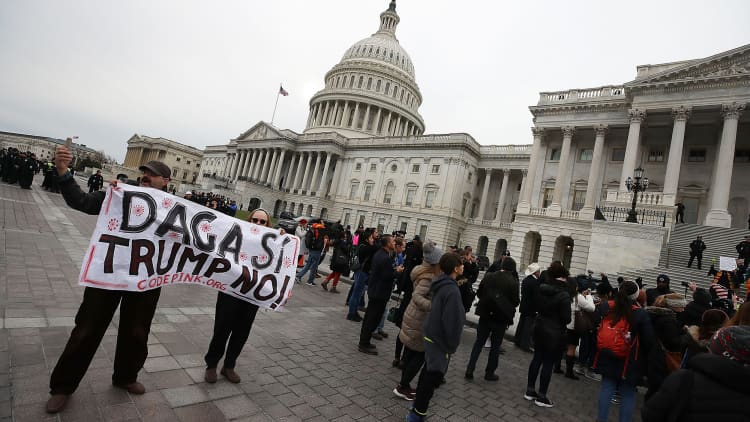
Congress has only a few more days to pass a spending bill or see the government shut down for the third time this year.
Between Monday and the midnight Friday deadline to fund the government, some lawmakers could try to take advantage of one of their last chances to score political points before November's fight for control of Congress. Lawmakers aim to pass legislation to fund the government through the end of September. But familiar political fights like immigration and health care threaten to hold up a budget deal Congress reached last month.
Meanwhile, Illinois will hold its primary elections on Tuesday. One notable incumbent House Democrat in the state is vulnerable to a primary challenger. Illinois voters will also choose Democratic challengers for Republican-held seats the minority party hopes to flip later this year.
Here's what to watch in the battle for Congress this week.
Spending fight
Congress likely wants to avoid the year's third shutdown embarrassment as lawmakers try to turn their attention to the campaign trail. As of now, Congress could be forced to approve its sixth short-term funding bill of the fiscal year if leaders cannot release and pass spending legislation by Friday.
Last month, lawmakers approved a bill that would allow them to bust through spending caps and boost military and domestic spending by about $300 billion over two years. Domestic money would go to things such as improving infrastructure and fighting the opioid crisis.
Congress had another six weeks to write the "omnibus" spending bill that would actually determine which agencies and programs got the money. Familiar political fights have slowed progress toward passing the bill this week.
Some in the GOP want the legislation to include more money for immigration enforcement. Others want to allow the Trump administration to take funding away from so-called sanctuary cities. Democrats are unlikely to support either measure.
The Affordable Care Act also is a point of contention. Some Democrats and Republicans aim to include provisions to help reduce health-care premium costs on Obamacare exchanges.
Conservatives have pushed back, arguing that they do not want to prop up the health-care law. Some Republicans also oppose subsidies for insurers who cover abortion.
Trump also has reportedly opposed a plan to put $900 million toward a rail tunnel project under the Hudson River. House Republicans in both New Jersey and New York could hesitate to support the spending legislation if it does not include the money meant to improve transportation into New York City.
Illinois primary
Illinois will hold primary elections on Tuesday. The state has a few compelling House races that will help to determine control of the chamber in November. Neither of the Democratic senators from Illinois face re-election this year.
One primary battle Tuesday holds immediate stakes for the soul of the Democratic Party. Moderate Democratic Rep. Daniel Lipinski faces a primary challenge in the suburban Chicago 3rd District, which he has represented since 2005.
Marketing executive Marie Newman has cast herself as a more progressive option than Lipinski, who co-chairs the Blue Dog Coalition of House Democrats, who portray themselves as moderates. Independent Sen. Bernie Sanders of Vermont and Democratic Sen. Kirsten Gillibrand of New York have both backed Newman. Sanders and Gillibrand are often mentioned as potential Democratic candidates for president in 2020.
Newman has attacked the incumbent Lipinski for opposing abortion rights and not taking a strong enough stance to support LGBTQ rights. House Democrats' campaign arm, the Democratic Congressional Campaign Committee, has not outwardly endorsed Lipinski.
Arthur Jones is running unopposed on the Republican side of the race. He is a Holocaust denier whom the state's Republican Party has disavowed.
At least two Republican-held House seats in the state are on Democrats' radar as the party tries to flip the 24 districts needed to take a majority in the chamber. Illinois' 12th District, represented by Republican Rep. Mike Bost, is a high priority for House Democrats' campaign arm.
Bost will likely win a primary challenge Tuesday from 27-year-old Libertarian candidate Preston Nelson. On the Democratic side, the DCCC has endorsed Brendan Kelly, a prosecutor in the state's St. Clair County and a U.S. Navy veteran.
Bost has represented the district in the southwest corner of Illinois since 2015. Democrats see a pickup opportunity because former President Barack Obama won the area twice before President Donald Trump carried it in 2016.
Elections analysis websites Cook Political Report and Sabato's Crystal Ball both rate it as a "toss-up."
A crowded field of Democrats is vying to determine who will take on Republican Rep. Peter Roskam in Illinois' 6th District, which sits in Chicago's suburbs. Among the candidates is attorney Amanda Howland, who won the 2016 Democratic primary but lost to Roskam by nearly 20 percentage points.
Candidates Sean Casten and Kelly Mazeski, both scientists, lead the fundraising race on the Democratic side.
The Cook Political Report rates Roskam's seat as a "toss-up," while Sabato's Crystal Ball says it "leans Republican."
WATCH: This is what happens when the U.S. government shuts down



